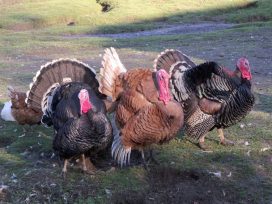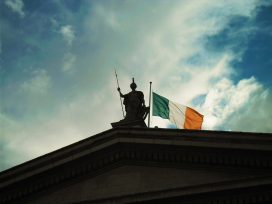In January 2016, I moved to Swansea in south west Wales. Together with my partner and young children, I drove from Gateshead, in the north east of England, where I had been living since 2007. I had not lived in Wales, which is where I was raised, since 2001. The children were four and one years old at the time: too young to object to being moved around. When we got to Swansea we parked outside Joe’s Ice Cream shop in the Mumbles – a café that is iconic in the area for its ice-cream. We looked at the neon blue lights glowing in the dark as we decided which one of us would go out to get milk and something to eat.
We arrived at our new house and it rained non-stop for two months. I went out to buy a new pair of shoes, appreciating that my old ones would not work in this city. How did people live with so much rain? Did it rain like this every day? It was cold almost all year round in the north east, but it was rarely wet. I had got used to the dry weather and its effects on how I styled my hair or what I would wear. I had forgotten the stuff that I had been glad to get away from.
We began on the work of establishing new habits: this is the way we will drive to school; this is where we will go for coffee. It was odd being able to play Radio Cymru in the car but beyond that, things were not that different. Two separate countries? Perhaps. I was not sure what I had expected from this move. Not yet getting a full night’s sleep, I found it difficult to think about much at all.
I phoned schools and nurseries asking if they had space for my children. I worried about them settling. I dropped them off, unsure about these new people now taking care of them. In these moments I was grateful for small talk. This put me at ease when everything felt so uncertain. But I needed the talk to remain small. Why did you move? When people asked big questions I found myself ill prepared to answer.
I heard what a wonderful place Swansea was to live. And I heard their surprise that I would want to move here at all. How was it possible to think of this place as both so beautiful and a bit shameful at the same time?
By June, the weather had warmed. We hired workers to help us fix the house. The kitchen was declared ridden with dry rot. We had to strip walls, pull up floors and dismantle ceilings. In as much as we had a plan, this was not part of it. Yet, although the weather was wet, the humour was not: ‘the best thing in this house is the door’. We made friends. And we began the work of destroying the house in order to put it back together again. As the established passages and energies of the house were disturbed, a nest of mice was set free. I remember watching them scuttle by as I read a good night story to my children. I began to develop new reserves of calm.
It was in the middle of this mess that I learned about the Brexit vote. An MP was killed outside her constituency office, there was a marked rise in racist attacks against minority communities, and no politician was able to capture the national mood. I walked the streets wondering what I had moved into.
Still, it felt good to watch the sun set over the sea.
*
In his book, Heroic Failure: Brexit and the Politics of Pain, Fintan O’Toole enquires into the emotional politics of Brexit. He begins by discussing how, having grown up in Ireland, he is well-versed in ideas about us and them. For him, these are not only concepts but felt experiences:
The English were scientific rationalists; so we Irish had to be mystical dreamers of dreams. They were Anglo-Saxons; we were Celts. They had a monarchy, so we had to have a republic. They developed a welfare state; so we relied on the tender mercies of charity. In other words, I know exactly what an either/or identity looks and feels like.
For me, ideas about us and them form part of the experience of growing up in a Welsh-speaking culture. O’Toole describes the ways in which ‘England’ was often posited as what Ireland was not. This became more complicated as he grew up and saw aunts and uncles leave to take advantage of opportunities for education in England, made possible by the welfare stare. He also saw how they fled the oppressive prejudices and worldviews that went with growing up Irish – which is not to say that such prejudices do not exist elsewhere. Many Welsh and Welsh-speaking people have similarly sought to escape the cultural experiences that shape the ways they see the world, even as we also find ourselves periodically returning to them. Yet it is difficult to articulate that ambivalent experience.
From this starting point, O’Toole develops an argument about self-pity as the emotion behind English nationalism. This, for him, explains how an elitist right-wing Eurosceptic movement can succeed in presenting England – and by extension Britain – as a nation under attack. Ideas about ‘heroic failure’ are central to this ideology. He refers to the case of the HMS Terror – one of two ships lost during Sir John Franklin’s calamitous expedition to discover the Northwest Passage in 1848, when all 129 of the crew died. Despite the death toll, this was narrated as a story about the heroism of Victorian men. Similarly, on Franklin’s first journey in search of the Northwest Passage in 1819–1820, nine men out of twenty were killed. Yet Franklin wrote about the success of the expedition, emphasising the ‘splendid display of those noble qualities which seem particularly distinctive of the Saxon race’. O’Toole’s point is that ideas about heroism, strength and independent spirit are pivotal to the ideology of English nationalism. Today, they are interwoven with populist politics, creating new forms of othering, misogyny and racism.
Heroic Failure presents an important story – that of English nationalism. For him, self-pity is what explains how, having colonised other countries, England and Britain can present itself as a colonised nation – as carrying the pain of those it has oppressed. Persuasive as it is, this argument neglects the multiple causes of the ‘leave’ vote – not least expanding inequalities, data harvesting and the ‘peculiar Englishness of Euroscepticism’. It also takes little account of the global politics of contemporary populism. Whilst I agree with that colonial histories are central to Brexit, I also feel there is more to say about how these reverberate in the present.
Watching Brexit unfold from Swansea, I am interested in how self-pity, the idea of a heroic spirit and the dream of self-determination are also adopted by progressive movements opposing Brexit. On 11 May 2019, thousands marched in Cardiff in favour of independence for Wales. For some, this was an old agenda that had found its time; for others, it formed a new way of articulating a solution to the global disasters we see around us. It was followed by another march on 27 July 2019 in Caernarfon, north Wales, and on 9 September 2019 by a march in Merthyr Tydfil, south Wales. This demand for sovereignty comes from a different political tradition to that of the British-US alliance of interests around privatisation and deregulation that is driving Brexit. The march in Cardiff included environmentalists, socialists, feminists and queer activists. Indeed, the philosophical histories of Welsh nationalism are very different to those British nationalism and mobilises a different set of values. However, when we focus on the political feelings and emotions that attach to these movements, we have to confront the uncomfortable proposition that the boundaries between progressive and reactionary politics are less clear cut.
Here, we might turn to critical theorist Ghassan Hage, who situates nationalism in relation to broader questions about how we go about inhabiting the world. Developing the concept of ‘domestication’, Hage asks us to consider identity politics in relation to how we make ourselves feel at home, and all the everyday practices of domination, control, extraction and exploitation that enable us to think of ourselves as different from other nations, ‘races’, indigenous populations, as well as animals, plants and species. By considering how we make our lives viable through various practices of domination, we can see how the urgent crises of the present cannot be solved by simply replacing one form of politics with another. It also becomes harder to distinguish between ‘us’ who are progressive and ‘them’ who need to be persuaded. This suggests that there are no easy routes to a better politics, and that the crises that need to be addressed are multiple.
*
In order to consider how ideas about Welsh identity are being reanimated amidst present-day shifts, it is worth returning to an old article by political philosopher Wendy Brown, entitled ‘Wounded Attachments’. The article is a reflection on ‘third wave’ feminism but is also instructive in thinking about populism. Brown argues that ideas about freedom are often formed alongside ideas about a wounded identity; and that political movements built around the experience of a wound risk reproducing the structures of oppression that they set out to oppose. Building a political movement around a common experience of oppression may make us too quick to believe that we can establish equivalence with other experiences that are very different. It may also lead us to think that we are naturally inclined towards kindness or humanitarianism, without reflecting on the politics of helping. As Jenny Edkins argues in Change and the Politics of Certainty, we risk seeing ourselves as ‘outside the world looking in, somehow superior and equipped to bring about change’, potentially disregarding ‘those who disagree with our ideas of what should be done’.
We often hear about Wales as a wounded subject. I notice it when a torrent of outrage emerges on my social media timelines about shops refusing to allow employees to speak in Welsh, or journalists mocking Welshness. This stuff is all too familiar, but the outrage is gathering a new intensity. Without dismissing the insult caused, we should be suspicious of the reaction. In her critical engagement with the politics of #metoo, Alison Phipps draws our attention to the ‘outrage economy’ of the new corporate media. She asks difficult but important questions about the idea of a white, wounded subject that underpins some of the #metoo disclosures. Whilst not denying the importance of narrating experiences of sexual violence, and committed as she is to supporting victims and survivors, Phipps invites us to ask questions about the politics of outrage. Noting the long histories of championing ‘speaking out’ in feminist movements, especially by women of colour, from Sojourner Truth to Audre Lorde, Phipps traces how it ‘can easily become speaking over in mainstream and social media publics’. In identifying ‘an orientation of political whiteness’, Phipps suggests congruences between ideas about victimhood and supremacy, something women of colour have long identified. This is relevant for thinking about feminism, but also about environmental movements and national liberation movements today.
We might choose, then, to be curious about the ways in which feelings of outrage and loss circulate. Who does it serve when Wales is posited as an entity that has survived centuries of history, and that needs to be saved and protected? Who emerges as the leaders of such a movement? When Wales appears as wounded, it also emerges as a certain people’s responsibility. This can be appealing. But it is a racialised and gendered politics: many of us are carrying enough responsibilities already. And in any case, who wants to be part of a culture that constantly imagines itself fighting for survival? Politics already seems exhausting enough.
In these times, ideas about identity and class are finding a new resonance. Brexit has often been explained in terms of the ‘white working class’, but it was middle-class voters that were crucial to the success of the ‘leave’. As Robbie Shilliam shows, the ‘white working class’ is both a fantasy and a racialised construct. He argues that ‘there is no politics of class that is not already racialised’ and that labour movements cannot recover their historical aims without reflecting on their starting points – that is, the ways in which their identity as a movement is a racialised identity. This helps to think about how ideas about Wales and Welshness are mobilised. For example, the people have historically been white, property owning, able-bodied, educated men. If ‘the people of Wales’ are finding their voice in the global context of a reanimated populism, we need to reflect on who we imagine these people to be. The implications of Shilliam’s argument are similar to those of Wendy Brown’s: we need to pay attention to the terms in we formulate our critiques.
*
Anna Burns’s novel Milkman addresses some of the implications of heightened nationalist politics in the context of recent British history. Situated in Northern Ireland during the Troubles, it provides a chilling account of the psycho-political atmosphere that can develop through ideas of ‘us’ and ‘them’: ideas that she describes as ‘convenient, familiar, insider’. The book reminds us of all the different forms that violence can take: pushing, pulling, shouting, disquieting, harassing, unsettling, coercing, intimidating and threatening. It also shows how nationalism can be felt as oppressive: ‘These were knife-edge times. Primal times, with everybody suspicious of everybody’. In this portrayal, ideas about us and them, men and women, gay and straight, are so pervasive that they destroy entire communities. Every banal decision becomes politicised:
Rules of allegiance, of tribal identification, of what was allowed and not allowed, matters didn’t stop at ‘their names’ and at ‘our names’, at ‘us’ and ‘them’, at ‘our community’ and ‘their community’, at ‘over the road’, ‘over the water’ and ‘over the border… There was food and drink, the right butter. The wrong butter. The tea of allegiance. The tea of betrayal. There were ‘our shops’ and ‘their shops’. Placenames. What school you went to. What prayers you said. What hymns you sang.
Moving from thinking about wounds to thinking about atmospheres allows us to consider how political allegiances and declarations become amplified and difficult to question. This is what is at stake under a ‘politics of certainty’, when there is little space left for doubt, ambivalence or uncertainty.
*
In her collection of essays Hope in the Dark, Rebecca Solnit develops an argument about a political imagination formed around uncertainty. She argues that rather than respond to the world with familiar solutions, we should experiment with inhabiting uncertainty. Of course, this is not easily done, not least because feelings of uncertainty are unequally distributed. But Solnit shares with Jenny Edkins a suspicion of suggestions that we can escape to another world. This leaves me wondering how Wales might be imagined as something other than a wounded/heroic subject – and how might we think about political action other than as a single route towards freedom, or as an event that can change everything. How that would open up views of who and where we are, beyond seeing this place as a site of pride and shame.
Welshness is not a single or uniform experience. But it offers an interesting vantage point for thinking critically about Brexit and the rise of a new identity politics. It can inform a politics that is wary of solutions and the drive to homogenise a culture. It can also offer an archive of other ideas about how to live and organise collectively. In this vein, Solnit argues that we don’t need to imagine another land over there or another society in the future, because other models of how to live are already available to us:
Activists often speak as though the solutions we need have not yet been launched or invented, as though we are starting from scratch, when often the real goal is to amplify the power and reach of existing alternatives. What we dream of is already present in the world.
For Solnit, the task is to refuse to look at history as a collective march towards a destination and to think instead about politics as part of the work of everyday life. History is in this sense viewed like ‘a crab scuttling sideways, a drip of soft water wearing away a stone, an earthquake breaking centuries of tension’.
Perhaps this, ultimately, is my experience of moving home. As the house settles around new energies, I prefer to avoid big, heavy ideas about this place. Instead, I am feeling my way towards another politics, scuttling sideways.
The author gratefully acknowledges The Leverhulme Trust for funding time to write.









